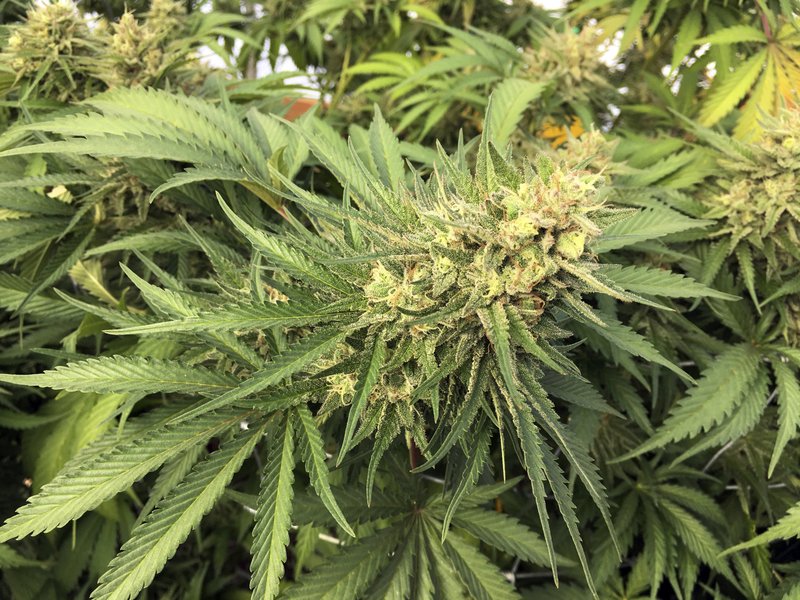FAYETTEVILLE -- Arkansas politics showed a Shakespearean edge Wednesday as the author of the state's medical marijuana amendment and the church-based Family Council Action Committee joined forces to oppose Issue 4, which would legalize recreational marijuana use for adults.
David Couch, an Arkansas attorney who authored the state's medical marijuana amendment, held a joint news conference with Jerry Cox, executive director of the committee, which has opposed efforts to legalize marijuana.
"This is a very important issue," Couch said. "Me and Jerry both know that it is kind of unique. It would have to be to get us on the same side. But this is a horrible issue."
Those 21 and older would be allowed to possess up to one ounce of marijuana bought from an authorized dispensary in Arkansas if the amendment is passed. The amendment would limit the number of dispensary licenses to 120 and the number of licensed cultivators to 20. The issue is on the ballot for the Nov. 8 general election.
Couch said the proposed amendment would remove most of the regulations and oversight written into the medical marijuana amendment and "create a monopoly" for a handful of people who would be licensed to grow and distribute in Arkansas.
Couch said the state now has eight growers who would remain in business under the new amendment along with a number of what he called "tier 2" cultivators who would be limited to growing no more than 250 marijuana plants.
"If we do marijuana for personal use, eight cultivators won't be able to handle the demand," Couch said. "That will lead to poor product and over-priced product."
Cox said he's in the middle of a 25-city tour of the state, meeting with church groups, chambers of commerce and other groups and organizations that have expressed concern with or opposition to the proposed amendment.
He appeared at a similar press conference last week with Melissa Fults who has been a longtime advocate for the drug, working as one of the lead campaigners for the medical cannabis amendment. She is executive director of the nonprofit Arkansans for Cannabis Reform. Fults had proposed her own amendment to legalize cannabis but scrapped that effort, instead pledging to defeat the Adult Use Cannabis Amendment.
Cox said the committee has printed about 500,000 flyers to local churches to distribute. The flyers are headlined "Arkansas Does Not Need Another Drug Problem" and likens marijuana to other drugs by saying "Deadly meth, opioids, heroin and fentanyl are already destroying too many lives."
Responsible Growth Arkansas is advocating for the passage of the amendment to the Arkansas Constitution, which will authorize the possession, personal use and consumption of cannabis by adults 21 and over, as well as the cultivation and sale of cannabis by licensed commercial facilities.
Eddie Armstrong, chairman of Responsible Growth Arkansas, a pro-marijuana legalization group, said earlier this month in an Arkansas Democrat-Gazette story he wasn't surprised to hear about the opposition campaign and that he doesn't believe Responsible Growth Arkansas needs to change its approach in response.
"We have been campaigning statewide for over a year now," Armstrong said. "It started with us going across the state getting almost 200,000 signatures, and it shows in recent polling that emphasizes the statewide support that is twice as high as the opposition."
Armstrong said Responsible Growth Arkansas plans to continue to get its message out to the public.
"We will continue with the message of supporting cancer research, creating a better economy, creating new jobs and supporting law enforcement," he said.
Both Couch and Cox said the proposed Issue 4 would create a monopoly on marijuana growth and distribution in Arkansas.
Couch called the backers of the issue, including the current cultivators and distributors and their financial supporters, "the marijuana cartel."
"They have crafted this thing so they'll make all the money and they'll make it forever," he said.
Cox said his group is running "a ground game" fighting millions of dollars worth of television ads from "out-of-state interests" pitching the issue to voters.
"We are Arkansans," Cox said. "This is our home, and we are going to defend it. They're trying to buy their way into our state Constitution, and if it works it's going to be practically impossible to get it out."
Couch said he still favors legalization of marijuana for personal use and said if voters really want that they should defeat Issue 4 and work to get a better proposal on the ballot in 2024. He said Issue 4 limits the authority of the state to make changes in the law or to regulate the businesses if the law goes into effect.
"The medical marijuana amendment left the Legislature with the ability to tweak the law," Couch said. "Issue 4 limits the Legislature's ability to change it, to tax it or to regulate it. It says it over and over and over again."
Ballot issue
Arkansas voters will decide the fate of a proposed constitutional amendment to legalize personal use of marijuana by adults in the Nov. 8 general election. The measure was placed on the ballot after a petition drive gathered enough signatures of registered voters. It’s name is: An Amendment to authorize the possession, personal use, and consumption of cannabis by adults, to authorize the cultivation and sale of cannabis by licensed commercial facilities, and to provide for the regulation of those facilities.
Source: Arkansas

